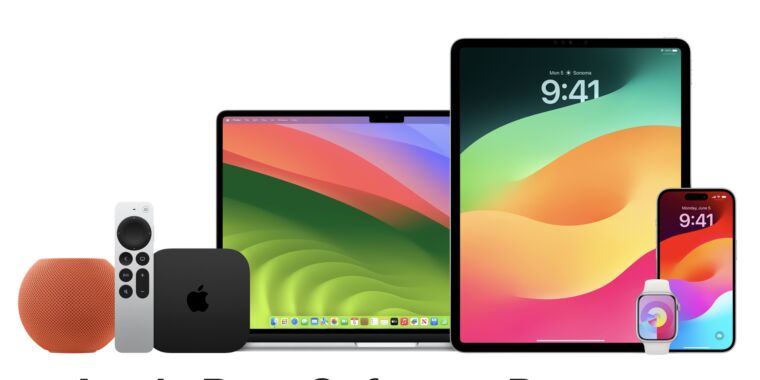This isn’t new at all. Apple has been consistent with long term updates for a while.
iPhones have been getting at least 5 major annual updates sense the iPhone 4. The average is 6 updates.
If anything, it gets to a point where the old hardware can barley handle the newer OS.
This is the equivalent of them promising to be called Apple in 5 years - it changes absolutly nothing.
https://en.m.wikipedia.org/wiki/IOS_version_history
Edit: thinking about it, this gives them an excuse to reduce the number of years they support phones. Instead of 6-7, can we now expect that to become only 5 years?
This could be a huge loss disguised as a win
If they wanted to limit support to 5 years, they could’ve done so already. Apple never guarantees any support length, so they’re just committing to the minimum this new UK regulation requires. This is probably nothing more than a formality.
Didn’t Apple push updates to older devices that made them slower so that you’d buy their newest?
Depends how cynical you want to be and whether or not you trust Apple.
They claimed to slow things down so the aging batteries could run for close to as long as they could when they were new
Just give me a performance slider so I can slow my phone down myself when I need it.
Anyway I have an android, battery lasts 2-3 days with normal usage (like 3h SoT per day for 3 days usage) so I don’t think I’ll have to worry about battery - and batteries are getting better with every new model, we’ll eventually reach a point where they’re a non-issue
It was more that older batteries can’t handle the power draw, so they would shut down if the power draw spiked by an expensive operation.
It was a really bad user experience so Apple throttled so phones wouldn’t crash.
Oh I thought it was just to get some extra juice out of the batteries, thanks for the info
This myth keeps propagating online and it seems people never try to even Google what the issue was.
I think the main issue (amongst the tech community) was that they did this with out making it known to users (patch notes don’t count - especially with autoupdates, who reads them?) the device just started getting slower.
If there was an option that was presented to users once the device got below 80% battery health to slow down the system to make daily batter life longer, then that would be an actually welcome feature. The problem was Apple just went a did it, and to a normal non-technical user, that means their phone is dying and they need to upgrade.
Why in the world do patch notes “not count”? The whole point of those is to communicate changes to the users.
Because in the world of auto updates, patch notes aren’t presented to users, and the average user isn’t seeking them out to read them. They essentially just wake up to a new OS.
A what’s new pop up or something would be more effective.
A what’s new pop-up that would immediately be closed by 99.99% of users because the patch notes literally take twenty minutes to read (I read them all). It’s not useful to waste time adding a dialog that the vast vast majority of users aren’t going to use and that users that want to see it can literally just click the update notes in the settings dialog.
Pop up
“Hi, you’re battery is getting old. Would you like to enable a mode that slows down your phone to preserve battery life, Yes or No.”
I suppose it may be the Mandela effect, but I thought they did announce it, just not everyone read it.
Just like the idiots at work who ignored a newsletter, two email blasts and announcement on a support text that there would be an upgrade. Then marched blindly ahead for the three week transition, ignored the support threads about upgrading, and it was suddenly our fault when the old systems “disappeared without warning”
Or broke their screens
A battery that lasts 8 hours and is a little slower, or a battery that lasts an hour… huh that’s a pretty easy choice, but yeah it can always be swung to make someone look bad.
It’s more like a phone that slightly slower, or a phone that will randomly turn off. Pretty sure everyone would want the first.
The phone would shutoff because the battery would under volt, it was usually around an hour. So what did you think you were correcting…?
You’re being less specific lmfao.
It had nothing to do with the capacity of the battery. It had to do with providing instantaneous high current when doing something demanding. Old batteries couldn’t do this and voltage would drop to unsustainable levels causing a brown out/black out.
Because the capacity was diminished…. New batteries didn’t have this issues since they were… well new…and had the capacity.
In a fully charged battery you could run demanding stuff, it’s only when the charge depleted that it became an issue, which is it couldn’t acces the capacity for the extra voltage anymore.
Without capacity, you can’t provide the high current… they’re literally related and go hand in hand………
Again, you’re literally explaining more or less the same thing, in a far less technical way… so sure to a laymen you’re “correct”, but that’s where it ends.
But it’s NOT a capacity problem. The phone would turn off and then turn back on. The batteries still had power.
It’s funny you say I am less technical when I describe the exact technical reason for a shutdown. You just keep saying the same thing.
It’s a chemical aging issue with batteries. As they age they cannot provide the same amount of current at the same charge level.
Current draw is not even close to steady, there are lots of spikes. It’s the spike that is a problem.
If you had a new battery that had say 500mAh of charge remaining the issue wouldn’t happen. If you had an old battery with 2000mAh of charge remaining it’s very possible the issue happens.
Hopefully this is a simple way to describe to you that capacity does not matter. It’s all about current.
Yeah the problem isn’t so much that apple did that (a slower but functional device is infinitely better than a device that doesn’t function), but that they didn’t communicate it to users, and even after a battery replacement, the phone would often stick to being throttled (not sure if this was just for third party repairs or all repairs, but either isn’t acceptable).
I believe that was for incorrectly done 3rd party repairs. I believe they did add it to release notes that nobody reads, but essentially you are correct. They got sued not for slowing the phones down, but for not being transparent about it.
If by “incorrectly done” third party repairs, you mean ones that don’t subscribe to apple’s repair programme that insists on you giving up user’s personal information, only using Apple parts both in the device and for the disassembly, and paying Apple fees, then sure.
But that’s not how third party repairs should be done and you’d be massive cunt for championing that kind of bullshit business practice.
I think it’s more about using shitty batteries. Some 3rd party shops will buy the cheapest batteries in order to get a cheaper fee/make more money. From experience the cheap batteries are horrible and don’t anywhere near the performance of a quality battery.
Public commitment to what? That’s two years less than Google’s latest Pixel.
Those updates are easy when you have to release an system update to update the safari browser. Hell, you could call it a major security fix and fix some security issue on an old phone and every fanboy would be like “OMG iPhone 3s got an update.🤤” whereas Google can just ship browser fixes over the app store.
And version history means jack all when you can just name releases as you please. Google has been doing the same thing last 5-10 years. Emoji mixers, magic cleaner, launcher with google search bar at the bottom, turning a toggle into a big button on nav bar, enabling aren’t major updates. Sure there are underlying changes, but they’re mostly security patches and bugfixes. Android is still a bloated mess that needs ungodly amount of RAM and processing to keep even few apps running reliably in the background.
And guess where did Google learn this deceptive “long term update support” trend from?
The only thing they’ll need is to decouple chrome and require a system update, and they could be providing updates for a decade.
Those updates are easy when you have to release a system update to update the safari browser. Hell, you could call it a major security fix and fix some security issue on an old phone and every fanboy would be like “OMG iPhone 3s got an update.🤤” whereas Google can just ship browser fixes over the app store.
Except that’s not what Apple means when they say they’ll update phones for five years. Security fixes aren’t the same as full iOS versions.
iOS 17, which came out September 2023, is available for the iPhone XR and XS, which came out in September of 2018. That’s a full OS update with all the non-hardware-based bells and whistles.
Security patches may very well release for older phones, but not full OS updates. Earlier this year they dropped a security patch for the iPhone 6S, a phone from 2015.
From first supply date.
I’d be more impressed if the did it from last supply date.
They still sell the 13, so you’ll only get 3 updates, not 5 with this announcement.
“At least”. Most iPhones have been updated for 7 years or more
My last phone lasted me 10 years, and even then I was tempted to just swap out some parts to keep it running.
There’s no reason 10+ years couldn’t be the norm for a smartphone, at least for people that don’t need a portable RTX 4090.
My iPhone 6 was still getting security updates last year. Battery lasted all day (I replaced it myself 2yrs before that). Solid phone. Handed it down to my daughter. Definitely at that point with technology that the requirements for a phone aren’t going up as fast as tech has so there’s less reason to replace things all the time. My last PC was up to 12years before I turned it into a server and built a new one.
They’ve been doing this for years
They’ve been doing this, but because others have not been doing this, there is now regulation in this space.
Apple had to disclose this in writing to be fully compliant with PSTI.
All in all, Apple had to agree to this in writing to be compliant with PSTI. They’ve already been doing this for a long time.
This is kind of like asking the Fast and Furious franchise to agree, in writing, to talk about family.
my friend has a 20yr old core 2 duo system with the latest updates on windows 10
Comparing apples to oranges are we?
the difference here is just standardization.
Huh? In what way.
x86 hardware is standardized in a way where you don’t need to port an os to them, it just runs with generic drivers.
arm still needs a custom kernel and conpletely different drivers to even boot, because every manifacturer can implement it completely differently.
there are efforts to fix this (namely project mainline and some work on uefi standards) but they arent done and wont be for a good while.
First of all, you’re implying it runs latest Windows - but Windows 11 shipped a few years ago.
Second - not really a fair comparison. 18 years ago the iPhone didn’t even exist. And the oldest model (17 years old) had really weak hardware. 4GB of storage, 128MB of RAM, and the CPU was an order of magnitude slower than current spec CPUs (it was also 32 bit - and 64 bit ARM is a completely new architecture - similar to the failed Itanium).
Even if it was supported, it would be a horrible experience.
i specifically said it runs the latest updates on win10.
deleted by creator
try it yourself, but dont expect it to be good. a lot of hardware sold today, especially very cheap hw on the 3rd world, still has similar performance than 15year old hardware. think atoms celerons and such.
if it were up to me id be running linux on it, but it works if you need it to.
The core 2 duo was released 18 years ago.
well, about 20 years old then
Big difference: on android you can stay 6 version behind and you probably find any incompatible app during real life use. Browser and framework (google play services) continue to get updates
On iOS once your device stops getting updates it becomes ewaste as almost every app becomes incompatible after 1-2 years . Browser stops getting updates at all so your browsing experience will degrade fast
Not sure where you got that, my iPhone 6 was still getting OS updates last year (mostly security ones). I didn’t have any issues with the App Store either. Now there were a few apps like Pokémon Go that the phone couldn’t handle, but that’d be true io any old PC. Devs gear their apps to the larger percentage of devices so they can leverage the newer tech. Progress is what it is. Devs aren’t going to code for a 10yo phone if 0.5% of people have it.
Don’t forget you can get 10+ years of software support through third party devs
LineageOS comes to mind
That’s true, but this happens because usually 95% of people are always on the latest version a few months after the new version was released. For developers, it’s really not worth supporting older versions when the overwhelming majority of users already upgraded.
Still, many large companies still support older versions when the user base is very huge. I work for a huge bank and we had to support all the way to iOS 10. Only this year it was recently upped to iOS 14, which now covers probably 99.99% of users.
And if you stay that many versions behind, you carry a gold mine of vulnerabilities that can be exploited. Your phone might work, but it’s far from a safe or good idea.
Android and iOS developer here. Web and app.
I have so many damn phones floating around my damn desk. I have near old iOS devices that are still solid for web browsing.
The bigger problem is that mobile processors saw MASSIVE performance changes over the past decade, and apps that are developed for new silicon run like shit on old ass hardware.
In other words, performance with new apps is the pain I feel first. Browsing the web on an old iPhone 6 is generally fine.
Still low, my lineageos phone is going 8 years and is on latest android (and the device wasn’t new when I bought it).









